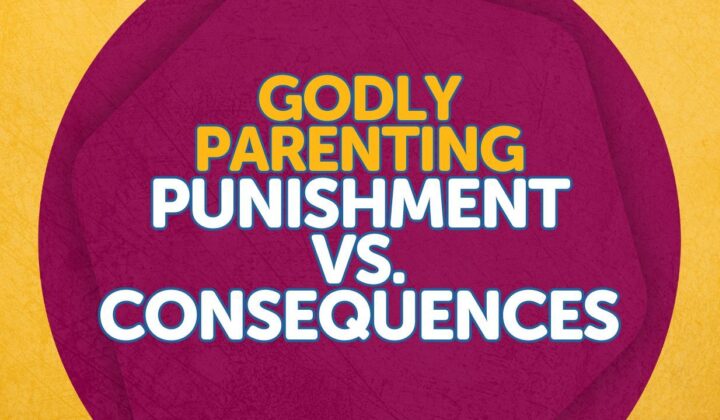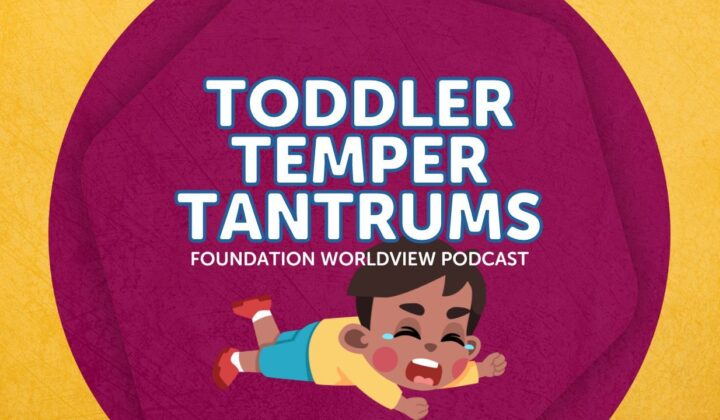Learn more about the journey that led to us equipping kids to carefully evaluate every idea they encounter.
Meet members of our team who have contributed to curriculum development.
Hear from real users of the Foundation Curriculum.
Learn what we believe about God, Jesus, Scripture, and more.
How to Discipline Young Children While Showing Grace
Hello, friends! Today’s podcast question is:
"Is there a developmentally appropriate way to demonstrate grace to a toddler when disciplining them?"
Such an interesting question! Even if you’re not currently raising or working with a toddler, this topic applies to children of all ages. So today, we’re diving deep into how we can show grace when disciplining—at any developmental stage.
Understanding Grace vs. Mercy
When we talk about showing grace to our children during discipline, we must first define grace. In Scripture, “grace” comes from the Greek word charis, which means favor, blessing, or kindness. Biblically, grace refers to God giving us blessings we do not deserve—like being adopted as His children and redeemed through Christ.
Now, over the years, I’ve heard many Christian parents talk about “extending grace” by withholding punishment. However, that’s not technically grace—that’s mercy.
-
Mercy is not getting the punishment we deserve.
-
Grace is getting a blessing we don’t deserve.
Withholding a deserved punishment is showing mercy, not grace. Whether or not withholding punishment is appropriate in a given situation is a separate issue—but it’s important to make this distinction.
The Purpose of Discipline
Scripture consistently calls parents to discipline their children—not to pay them back for wrongdoing or to act out of anger, but to train them.
Human development research tells us that the brain isn’t fully formed until around age 26. This means that during the younger developmental stages, children’s minds, hearts, and habits are still being shaped. These are critical years for training in righteousness.
Consider Hebrews 12:5–11. While this passage isn’t addressed directly to parents, it uses the parent-child relationship to illustrate God’s discipline of us:
“For the Lord disciplines the one He loves... It is for discipline that you have to endure. God is treating you as sons...”
Discipline is assumed—it’s presented as a given. If we don’t discipline our children with love and consistency, we are not preparing them for the Christian life, which includes God’s loving discipline.
Can We Show Grace While Disciplining?
So, is it even possible to demonstrate grace while disciplining?
I’ll be honest—this is something I’ve wrestled with for years. What I’m about to share is where I currently land, though my thoughts may evolve over time. And I’d love to hear your thoughts, too! If you're watching on YouTube, feel free to comment.
My Current View:
Yes, we can and should show grace to our children during discipline. But that doesn’t mean we withhold consequences. Instead, we extend grace through the attitude and manner in which we discipline.
When children blatantly sin—like refusing to obey, hitting a sibling, or showing disrespect—what that behavior deserves is often a harsh response. But instead of reacting in kind, we can bless them with a calm, patient, and loving response.
Practical Steps for Grace-Filled Discipline
Now, this is easier said than done. It’s one thing to talk calmly behind a microphone—it’s another thing to stay composed in the moment.
Here’s how we can practically apply this:
-
Pause if needed. Take a minute to calm down before responding.
-
Ask questions. Even young children (as young as age 2) can begin to engage in simple reflection:
-
“What just happened?”
-
“What did you do?”
-
“Why did you do that?”
-
“Was that the right thing to do?”
-
-
Explain clearly. Tell them why their behavior was wrong and what the consequence will be. If you need time to decide, say:
-
“Mommy/Daddy needs a few minutes to think about what your consequence will be. But because I love you, I will give you a consequence to help train you to do what is right.”
-
-
Assure them of your love. Let them know:
-
“I love you. That doesn’t change based on what you do. I discipline you because I love you and want to help you grow.”
-
Real-Life Examples
I’ve seen several parents do this so well.
Example 1:
A friend of mine has a nearly 2-year-old who often tests boundaries. Recently, he disobeyed, and his dad calmly took him into another room and said something like:
“Daddy loves you. I’m not giving you a spanking because I’m mad. I’m giving you a spanking because I want you to remember the right thing to do.”
His son didn’t like it—he cried—but the discipline was delivered with calm, patient love. That’s grace.
Example 2:
Other friends handle sibling conflicts by first separating the children to cool down. Afterward, they approach each child to talk about what happened, why it was wrong, and what the consequence will be.
Mercy, Grace, and Biblical Parenting
To wrap up, let’s revisit the core truths:
-
Mercy = withholding deserved punishment
-
Grace = giving a blessing that’s not deserved
-
Discipline = required, biblical, and loving training
When our children sin, we are called to discipline them. But we can do so graciously—not by removing consequences, but by offering love, calmness, and patience they haven't earned in that moment. That’s how we reflect the character of God.
If you have a question you’d like answered on a future episode, visit foundationworldview.com/podcast to submit it.
As we close, my prayer is that in whatever situation you and the children in your care find yourselves, you would trust that God is working all things together for your good—conforming you more into the image of His Son.
I’ll see you next time.
Related Posts and insights

Is Gentle Parenting Biblical?
In this episode, Elizabeth Urbanowicz looks at the popular parenting style of Gentle Parenting and examines its methods through a biblical perspective.

Punishment vs Natural Consequences: Applying Biblical Wisdom to Parenting
Should Christian parents punish their kids or rely on natural consequences? Explore biblical discipline and how to train children in love and wisdom.

How to Deal with Toddler Tantrums
"How should I deal with my toddler's temper?" This episode dives into effective strategies like setting clear expectations, consistency in discipline, and developmentally suitable consequences.



